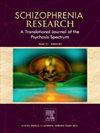精神病和非精神病情感性障碍组的地中海和标准美国饮食:症状和认知
IF 3.6
2区 医学
Q1 PSYCHIATRY
引用次数: 0
摘要
研究支持饮食与健康之间的联系,新出现的证据表明饮食与神经精神症状有关。然而,没有一项人类研究在严格定义的精神诊断中检查抗炎饮食及其与症状严重程度和认知的关系。由于炎症与精神疾病有关,我们调查了地中海饮食(MD)、抗炎饮食和标准美国饮食(SAD)的依从性,并检查了与精神症状和认知的横断面关系。方法:参与者包括54名精神障碍患者,30名非精神障碍情感障碍患者和40名健康对照。参与者接受了诊断性访谈、PANSS症状评分和matrix认知评估。自我报告GBAQ用于评估MD与SAD的依从性。结果:精神病组使用SAD的可能性显著高于健康对照组(p = 0.007),坚持服用抑郁症可预测更好的工作记忆(r = 0.461, p <;0.001)。在非精神病性情感性障碍组中,MD依从性预测较慢的处理速度(r = -0.376, p = 0.049)。在非精神病性情感性障碍组中,MD预测PANSS一般精神病理量表(r = -0.449, p = 0.013)以及激活(r = -0.362, p = 0.049)和烦躁情绪因素(r = -0.403, p = 0.027)降低。讨论:该研究首次在精神病患者中发现了不良的饮食选择,在跨诊断分析中显示出与MD相关的症状明显减轻和认知能力提高。它支持饮食干预预防和治疗精神疾病的研究。本文章由计算机程序翻译,如有差异,请以英文原文为准。
Mediterranean and standard American diet consumption in psychosis and non-psychosis affective disorders groups: Symptoms and cognition
Research supports an association between diet and health, and emerging evidence suggests that diet is associated with neuropsychiatric symptoms. However, no human study has examined an anti-inflammatory diet across rigorously defined psychiatric diagnoses and its associations with symptom severity and cognition. As inflammation is implicated in mental illness, we investigated adherence to the Mediterranean diet (MD), an anti-inflammatory diet, and the standard American diet (SAD), and examined cross-sectional relationships with psychiatric symptoms and cognition. Method: Participants included 54 individuals with psychotic disorders, 30 with non-psychosis affective disorders and 40 healthy controls. Participants underwent diagnostic interviews, PANSS symptom ratings, and MATRICS cognitive assessments. The self-report GBAQ was used to assess adherence to the MD versus SAD. Results: The psychosis group was significantly more likely to consume the SAD than healthy controls (p = 0.007), with MD adherence predicting better working memory (r = 0.461, p < 0.001). In the non-psychosis affective disorders group, MD adherence predicted slower processing speed (r = -0.376, p = 0.049). In the non-psychosis affective disorders group, MD predicted reduced PANSS General Psychopathology scale (r = -0.449, p = 0.013), as well as the Activation (r = -0.362, p = 0.049), and Dysphoric Mood factors (r = -0.403, p = 0.027).Discussion: This first-of-its kind study identified poor dietary choices in persons with psychosis, showing significantly lower symptoms and better cognition in association with the MD in transdiagnostic analyses. It supports the study of dietary interventions for prevention and treatment of psychiatric conditions.
求助全文
通过发布文献求助,成功后即可免费获取论文全文。
去求助
来源期刊

Schizophrenia Research
医学-精神病学
CiteScore
7.50
自引率
8.90%
发文量
429
审稿时长
10.2 weeks
期刊介绍:
As official journal of the Schizophrenia International Research Society (SIRS) Schizophrenia Research is THE journal of choice for international researchers and clinicians to share their work with the global schizophrenia research community. More than 6000 institutes have online or print (or both) access to this journal - the largest specialist journal in the field, with the largest readership!
Schizophrenia Research''s time to first decision is as fast as 6 weeks and its publishing speed is as fast as 4 weeks until online publication (corrected proof/Article in Press) after acceptance and 14 weeks from acceptance until publication in a printed issue.
The journal publishes novel papers that really contribute to understanding the biology and treatment of schizophrenic disorders; Schizophrenia Research brings together biological, clinical and psychological research in order to stimulate the synthesis of findings from all disciplines involved in improving patient outcomes in schizophrenia.
 求助内容:
求助内容: 应助结果提醒方式:
应助结果提醒方式:


